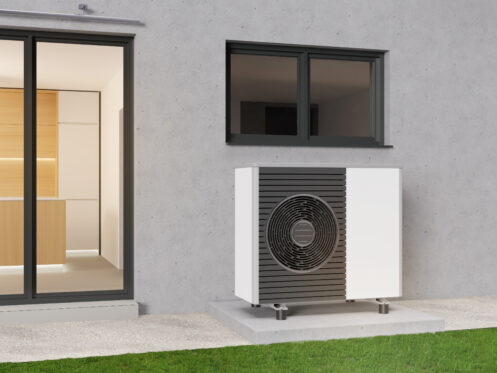Maintaining a comfortable and energy-efficient living environment in your Wichita, KS home is a top priority for homeowners all year round. When it comes to selecting the perfect heating solution for your home, you might find yourself weighing the benefits and features of two popular options: heat pumps and furnaces. Each system has unique characteristics that cater to specific climates, home types, and homeowner preferences, so understanding their differences is essential for making an informed decision. In this blog post, Midwest Mechanical will discuss the fundamentals of heat pumps and furnaces, comparing the factors influencing your choice, including efficiency, fuel types, and cost.
Heat pumps and furnaces approach the home heating process in different ways. While furnaces generate heat by burning fuel (gas, oil, or electricity), heat pumps extract heat from the outdoor air or ground and transfer it indoors. Consequently, these systems have unique capabilities and advantages that align with specific needs and preferences.
1. Energy Efficiency: Comparing Heat Pumps and Furnaces
When it comes to energy efficiency, heat pumps typically have an advantage over furnaces, especially in milder climates.
a) Heat Pumps: Heat pumps work more efficiently in moderate temperature ranges because they transfer heat rather than create it. When paired with a high-efficiency, variable-speed air handler, heat pumps can generate up to three times more heat output per unit of energy consumed compared to furnaces.
b) Furnaces: Although modern furnaces boast higher efficiency ratings than older models, they can still consume more energy than heat pumps in specific climates. However, high-efficiency gas furnaces achieve impressive Annual Fuel Utilization Efficiency (AFUE) ratings, making them a viable option for colder climates where heat pump efficiency decreases.
2. Fuel Types and Costs: Heat Pumps vs. Furnaces
The type of fuel used for a heating system directly impacts installation, maintenance, and ongoing energy costs.
a) Heat Pumps: Heat pumps primarily use electricity as fuel sources. This can lead to lower installation costs, simplified maintenance, and a cleaner energy source. However, electricity rates can be higher than natural gas or oil, making them less cost-effective in areas with high energy prices.
b) Furnaces: Furnaces offer a wider range of fuel options, including natural gas, propane, oil, and electricity. The fuel type selected can impact both the upfront and ongoing costs of the system, as well as its efficiency. Homeowners should consider local fuel pricing and availability when deciding between a heat pump and a furnace.
3. Installation and Maintenance Considerations
The ease of installation and the required maintenance are essential factors to consider when choosing between a heat pump and a furnace.
a) Heat Pumps: Installing a heat pump can be simpler and less expensive than a furnace, especially since it is a heating and cooling solution. Heat pumps typically have fewer moving parts compared to furnaces and may require less maintenance.
b) Furnaces: Furnaces tend to have more complicated installation requirements, especially when it comes to gas or oil models. Gas furnaces, for example, need a venting system for exhaust gases. Furnaces may also require more frequent maintenance checkups, particularly oil-fired models, to keep them running efficiently and safely.
4. Environmental and Health Implications
Examining heat pumps and furnaces’ environmental and health impacts is essential for homeowners who prioritize sustainability and indoor air quality.
a) Heat Pumps: As heat pumps utilize electricity, they do not produce direct greenhouse gas emissions. They can also be paired with renewable energy sources like solar power, making them a more environmentally friendly option. In addition, heat pumps don’t generate combustion byproducts, minimizing the risk to indoor air quality.
b) Furnaces: Furnaces, particularly gas and oil models, produce combustion byproducts, including nitrogen oxides, sulfur dioxide, and carbon monoxide. These emissions can impact outdoor air quality and contribute to greenhouse gas levels. Properly maintained and vented furnaces should minimize indoor air quality risks, but awareness of these potential concerns is essential.
Choosing the Right Heating Solution for Your Home
Understanding the key differences between heat pumps and furnaces can help homeowners decide on the ideal heating system for their specific needs. Heat pumps are ideal for mild to moderate climates and can provide energy-efficient heating and cooling while being environmentally friendly. On the other hand, furnaces are suitable for colder climates where heat pumps may struggle to maintain optimal efficiency, and a range of fuel options can cater to cost and availability concerns.
You can choose the heating system that best fits your climate, home, and values by weighing these factors and considering your unique preferences. Our team of professional technicians at Midwest Mechanical can help you navigate the differences between heat pumps and furnaces while providing expert guidance on the perfect solution for your home. Contact us today to learn more about our HVAC services in Wichita.
